Doing Good All Night Long
Pornhub is trying to burnish its image with “social good” PR, but will you swallow it?
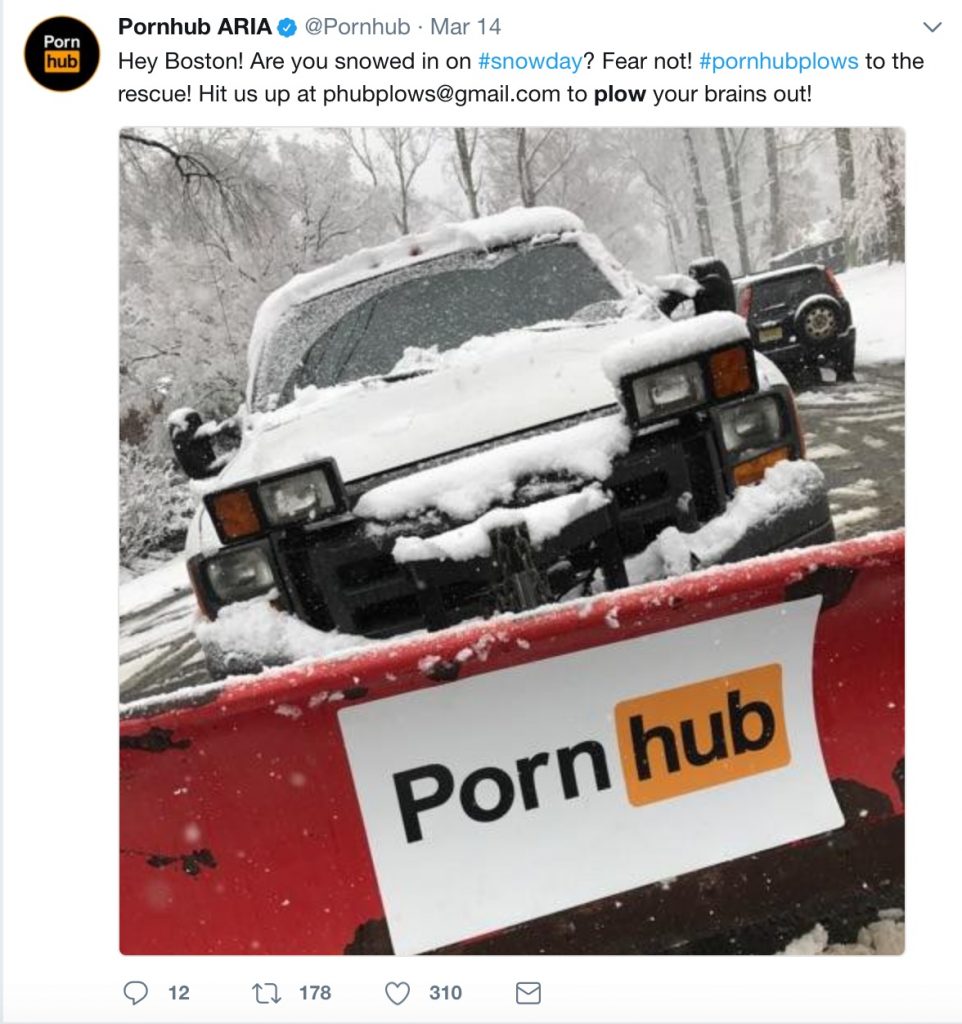
Towards the tail end of the wicked nor’easter that laid on massive snowdrifts this March, a fleet of about two dozen snowplows mobilized in Boston and parts of New Jersey and New York. They were hardly the only plows on the streets, but they drew an inordinate amount of attention. They’d been provided gratis by a private firm. They responded to underserved areas based on emails and Tweets sent to said company. And they were emblazoned with the company’s logo: the deep orange, black, and white sigil of Pornhub, the largest porn site on the net and for years one of the most heavily trafficked overall websites in the world.
While it crawled out of the shadows in the 1970s, porn remained so taboo and insular the industry didn’t, and couldn’t, do much outreach beyond its niche underworld. If porn garnered attention in the mainstream, it was either for some political kerfuffle, a porn star’s appearance on a salacious show, or an over-the-top stunt leaning into the scandal of the industry. “Think things like… offers to do porn,” said Chauntelle Tibbals, a sociologist who studies the porn industry, “directed at sensationalized mainstream media personalities.” Porn stars and adult producers who have tried to branch out, engaging in philanthropic ventures and speaking about them openly, have often run into significant barriers. By casually sending out a fleet of plows and engaging with the public openly as a mundane benefactor, Pornhub staged a real coup.
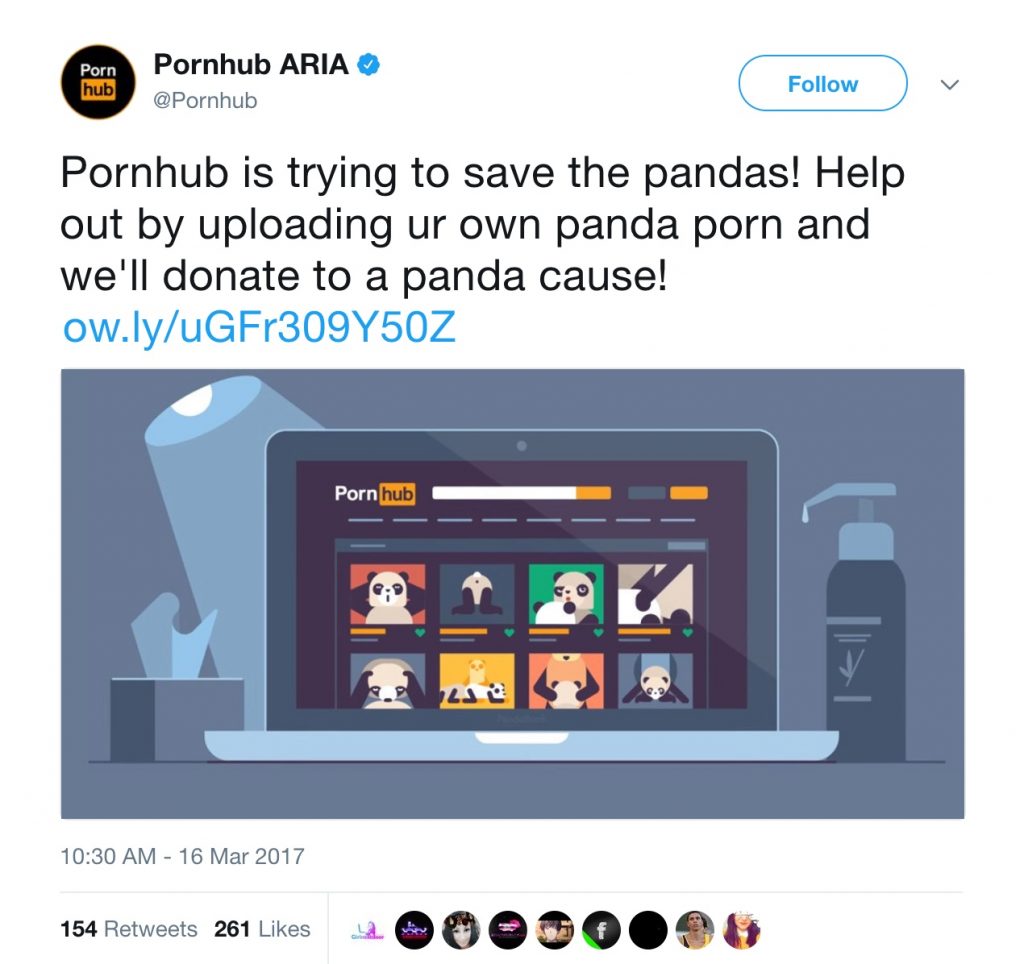
But this wasn’t a one-off. That same month, the site drew attention when it celebrated National Panda Day by encouraging viewers to dress up as pandas and make and post amateur sex videos (ostensibly to help the less-than-libidinous critters learn how to breed). The company further promised to donate $100 per video uploaded and $0.01 per view of said videos over the month to panda conservation non-profits. It was one of many charitable ventures launched by the Pornhub Cares initiative. The site also does sex ed through its Sexual Health Center and issues analyses of anonymous user data via its Insights and social media teams, which some mainstream writers hail as unprecedented, demystifying, and destigmatizing windows onto humanity’s collective id. Heavily promoted across the mainstream media by a savvy advertising team, these ventures reposition Pornhub as an agent of social good and proactive engagement rather than a vendor of smut and shame.
“Not only do these stories give the site free publicity,” wrote Slate’s Will Oremus in 2014, referring to Pornhub Insight’s data-driven consumer habits reports, “I’d imagine they go some way toward legitimizing it in the minds of readers by making them feel less perverted for all the time they spend there.”
Pornhub is not the only adult outfit looking to normalize and reframe porn through effective messaging built on outwardly progressive initiatives. People like the problematic pornstar James Deen and companies like adult content bundler Hump the Bundle have tried to put charity, public outreach, and education at the forefront of their activities. But Pornhub is the master of this engagement art, and the juggernaut of the industry. Its engagement has, analysts argue, been key to building the site into the widely recognizable behemoth it is now, not just a particularly profitable force within its niche industry as it has been since its earliest days.
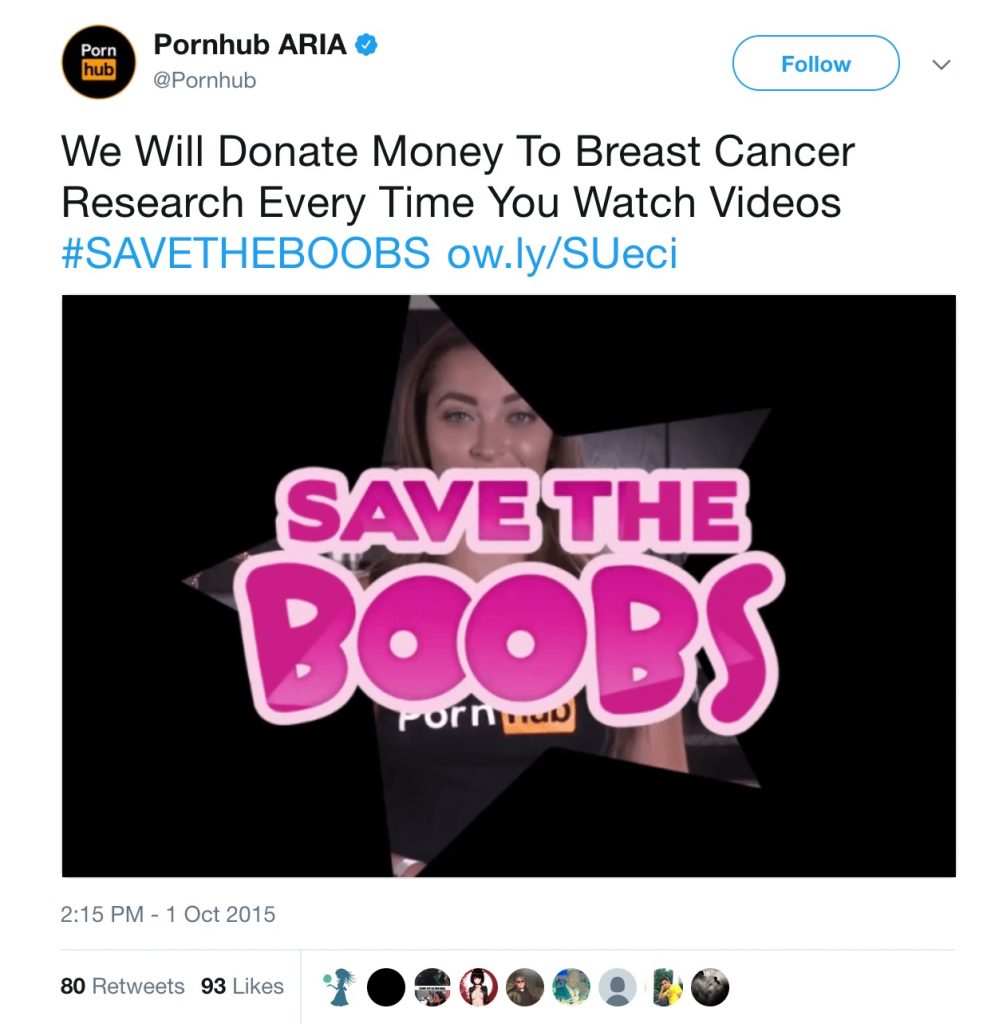
Pornhub blundered in its first efforts at script-flipping engagement. In 2012, the site launched a campaign to raise money for Susan G. Komen for the Cure, a major breast cancer charity, but their $75,000 donation was rejected and eventually given to three smaller, anonymous organizations. In 2013, CBS blocked their effort to run a safe-for-work ad, a bid at normalizing their product, during the Super Bowl. And in 2014, Spike TV blocked another ad, while a Pornhub billboard legally placed in New York’s Times Square was taken down within 48 hours after a nearby hotel complained about it.
Pornhub’s ads and campaigns still take flack, as when Parmigiano-Reggiano cheese makers in Italy threatened a defamation suit after Pornhub mentioned their product in a commercial. But broadly, Pornhub experimented and consulted outside marketing experts until they hit on an effective formula for initiatives with reliable, solid PR returns: Find a cause with practical or punny relation to porn and screen potential charity partners for cooperation beforehand. Hype projects with quirky yet socially aware and honest PR campaigns rather than solely salacious, tone-deaf sex appeal. Engage users via social media to talk about these campaigns to stress the firm’s continual engagement and humanity. Reporters slobbered up the resultant press releases. Think the Huffington Post’s “Pornhub Wants to ‘Give America Wood,’ Literally” coverage of the company’s first successful charity campaign, in which they planted one tree for every 100 videos watched in their “big dick” video category in the weeks leading up to Arbor Day 2014.
But none of this explains why Pornhub wanted to pursue these campaigns in the first place.![]() Pornhub’s parent company, MindGeek, plays things close to the vest with respect to its internal operations. Pornhub never replied to my requests to speak about the motives behind its social good initiatives.
Pornhub’s parent company, MindGeek, plays things close to the vest with respect to its internal operations. Pornhub never replied to my requests to speak about the motives behind its social good initiatives.
“There might be some element of actually doing good,” said Shira Tarrant, who published a comprehensive analysis on the back end of the adult industry last year. “If there’s someone behind the scenes…a gender studies major who’s like, ‘I’m going deep under cover to change the culture [of porn] from the inside,’ I wouldn’t know. But that would be interesting.” It would also be the simplest explanation: Pornhub actually does care about the charitable causes and education initiatives it gets behind. Those at the company see real value in opening up dialogue on sex and sexuality by normalizing their industry and dissecting our porn habits.
But, Tarrant said, it’s more likely that Pornhub’s just reacting to a very crowded porn market by testing a little of everything, including social good initiatives. In 2015 they launched a limited-run fashion line, featuring hats, sweaters, and t-shirts with graphics designed by graffiti artists, and launched a crowdfunding campaign to shoot a porno in space. They also developed a twerking butt sex toy, a FitBit equivalent for monitoring masturbation habits, and a short-lived music label, Pornhub Records, that put out Waka Flocka Flame’s single, “Bust,” and made a video for it. Marketing gurus praised these campaigns for catching people off guard with diverse projects that would draw brief spikes of general media attention, but also sustained attention from niche communities, like fashionistas, who may not regularly explore the porn world.
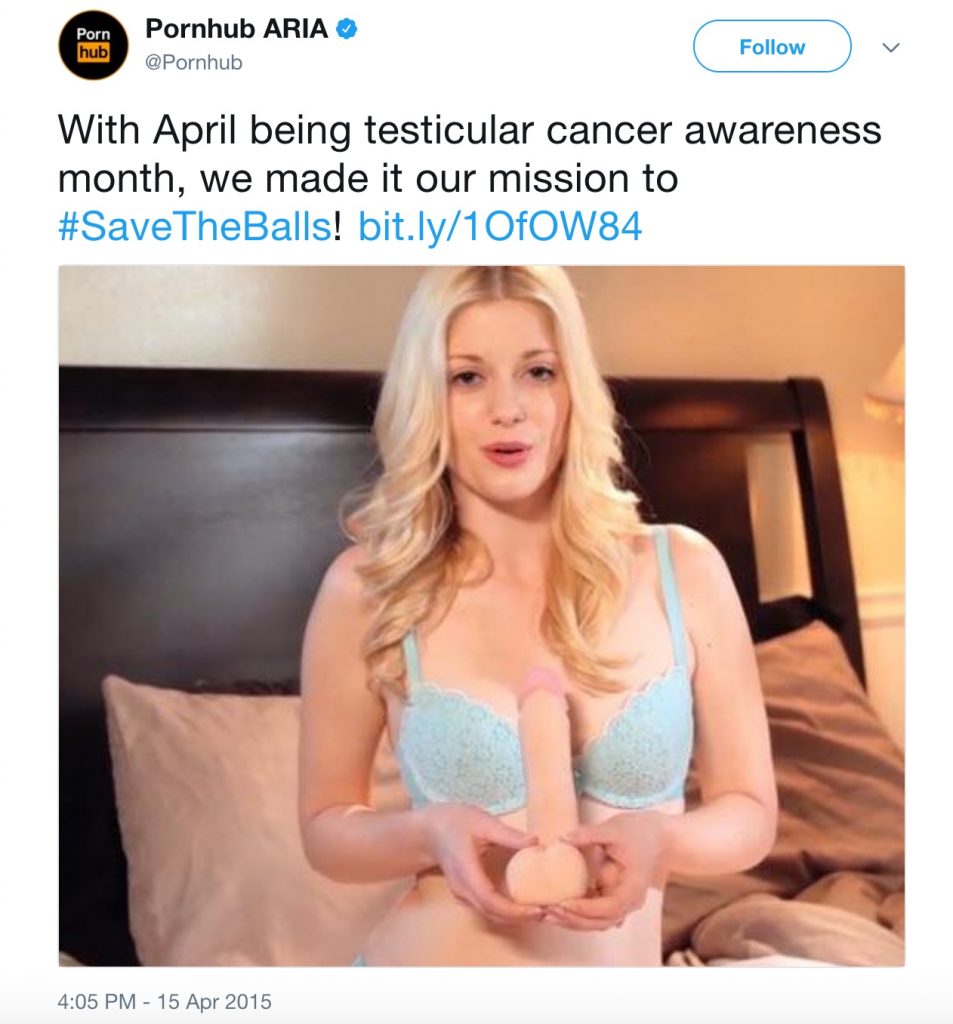
Pornhub’s charitable giving campaigns are a particularly cost-effective way to draw such larger but niche audiences. “Give America Wood” drew widespread attention, but in the end Pornhub only had to plant 1.5 million trees at a likely cost of just around $15,000, a lower expense for a higher return than their 2012 breast cancer campaign. “Getting worldwide publicity for your website on a budget of $15,000?” wrote digital business expert Gordon Fletcher in The Conversation that year. “That is the sort of achievement any marketing department would be wildly celebrating.”
Spinning the company as a conscientious force of social good helps wider advertising campaigns to make porn seem more mainstream—less seedy, more acceptable. This not only potentially draws in new viewers who wouldn’t engage with advertising unmoored from social consciousness, but also makes it viable for mainstream industries to advertise on the site without fear of hurting their own brands. Although as of last year Pornhub still had to offer steep discounts to attract advertisers, it’s been able to score deals with mainstream brands like food service Eat 24 (in 2013) and Italian fashion giant Diesel (in 2014). Pornhub also got itself featured in that year’s porn-focused film, Don Jon.![]() But Pornhub doesn’t need to fight tooth and nail for attention in the market. Since its launch in 2007, the site has always had the power of market disruption on its side, bringing a new wave of free porn to consumers and generating high traffic to survive on ads (mostly for intra-industry porn and sex toys). After 2010, its parent company merged with another company, becoming a borderline monopoly. This business, which eventually became MindGeek, bought up most of the major tube sites and porn studios on the market. By 2016, it controlled eight of the ten largest such entities. MindGeek would likely have seen nothing but sustained growth and profit from Pornhub and its wider tube network alone, without these campaigns and their hit-or-miss risks.
But Pornhub doesn’t need to fight tooth and nail for attention in the market. Since its launch in 2007, the site has always had the power of market disruption on its side, bringing a new wave of free porn to consumers and generating high traffic to survive on ads (mostly for intra-industry porn and sex toys). After 2010, its parent company merged with another company, becoming a borderline monopoly. This business, which eventually became MindGeek, bought up most of the major tube sites and porn studios on the market. By 2016, it controlled eight of the ten largest such entities. MindGeek would likely have seen nothing but sustained growth and profit from Pornhub and its wider tube network alone, without these campaigns and their hit-or-miss risks.
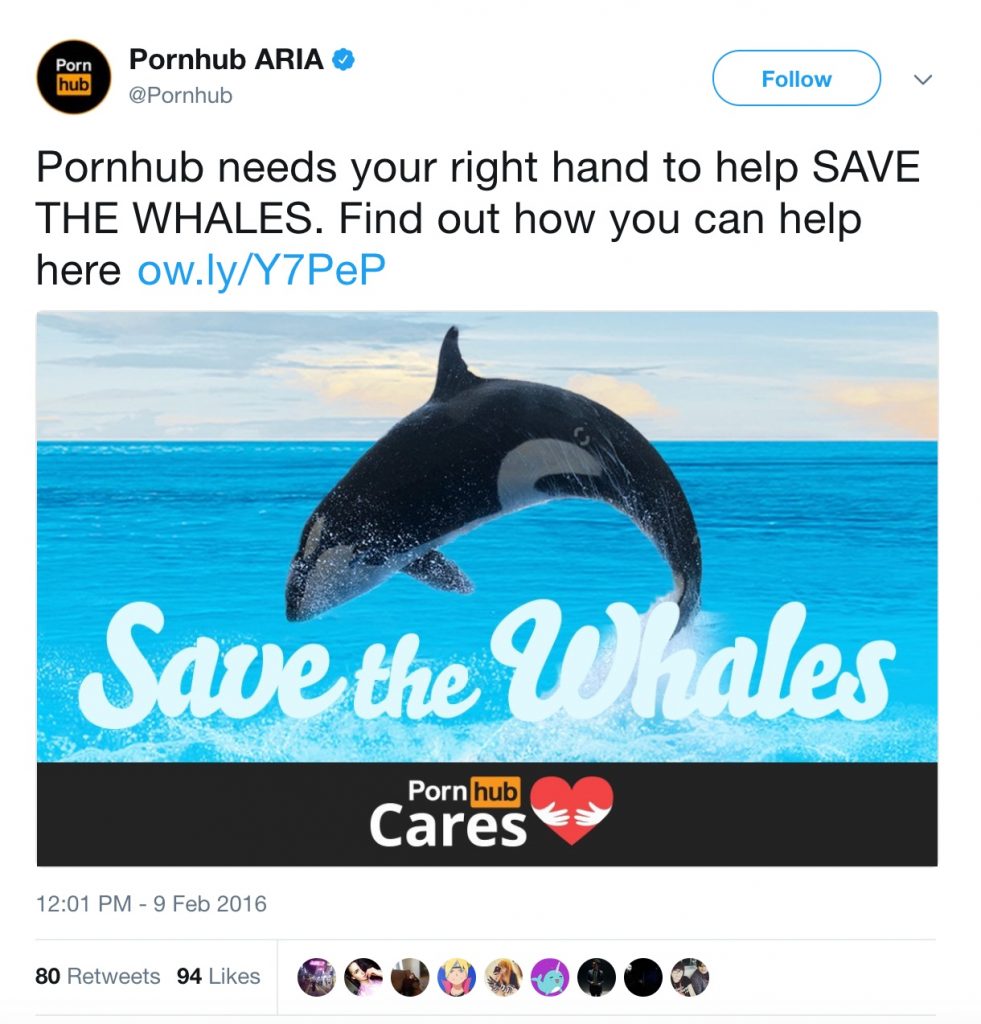
MindGeek is not the brainchild of the porn industry. Its precursor firm was first registered in 2007 by a German-born tech wiz named Fabian Thylmann, who cut his teeth in the 1990s developing web traffic monitoring software to help sites procure advertiser payouts. He reportedly fell into porn incidentally, while looking for applications for that tech. Thylmann always struck a more subdued pose than traditionally flamboyant porn lords, and reportedly brought a methodical, tech-world approach to his firm. Even though he had to leave MindGeek in 2013 after he was stung in Brussels for possible tax evasion, he left the company to the senior management he’d built up around him. MindGeek continues to sell mainstream and innocuous digital resources, like web hosting and data analytic services. Unsurprisingly, it also seemingly continues to operate more like a mainstream company than an old fashioned porn site, with a staff of about 1,200, many of whom come from outside the porn world, bringing ho-hum tech and comms tactics to the once idiosyncratic adult industry.
A number of adult companies are now likewise owned or heavily staffed by people with experience or backgrounds outside the industry, and increasingly run like mainstream corporations. And with that mainstream cultural influence likely comes the impulse to exercise “corporate social responsibility.” Snappy charitable campaigns don’t just put eyes on the company; they rewire the industry’s insular history. Sexual education campaigns and sex positive data-heavy conversations peel back and acknowledge the fantasy and market-driven aspects of porn, signaling introspection and an alliance with the forces of progressivism. Scholarships, like one Pornhub debuted last year, for women to study science, tech, engineering, and math ostensibly show that the company cares about the population usually painted as porn’s key victim. “This is corporate social responsibility for a jaded digital age,” Fletcher wrote in The Conversation after the 2014 Arbor Day campaign.![]() One could argue that, no matter their motives, Pornhub and the adult industry’s attempts to rebrand as normalized agents of social good are, well, good. The more it draws itself into the light, the more society can pick the adult industry over, creating visible dialogue about its shortcomings and pushing for more ethicality in an often fraught production system. The more it tells us about our sexual desires as a culture, the more we can have productive and easy conversations with each other about our wants, needs, and intimate identities.
One could argue that, no matter their motives, Pornhub and the adult industry’s attempts to rebrand as normalized agents of social good are, well, good. The more it draws itself into the light, the more society can pick the adult industry over, creating visible dialogue about its shortcomings and pushing for more ethicality in an often fraught production system. The more it tells us about our sexual desires as a culture, the more we can have productive and easy conversations with each other about our wants, needs, and intimate identities.
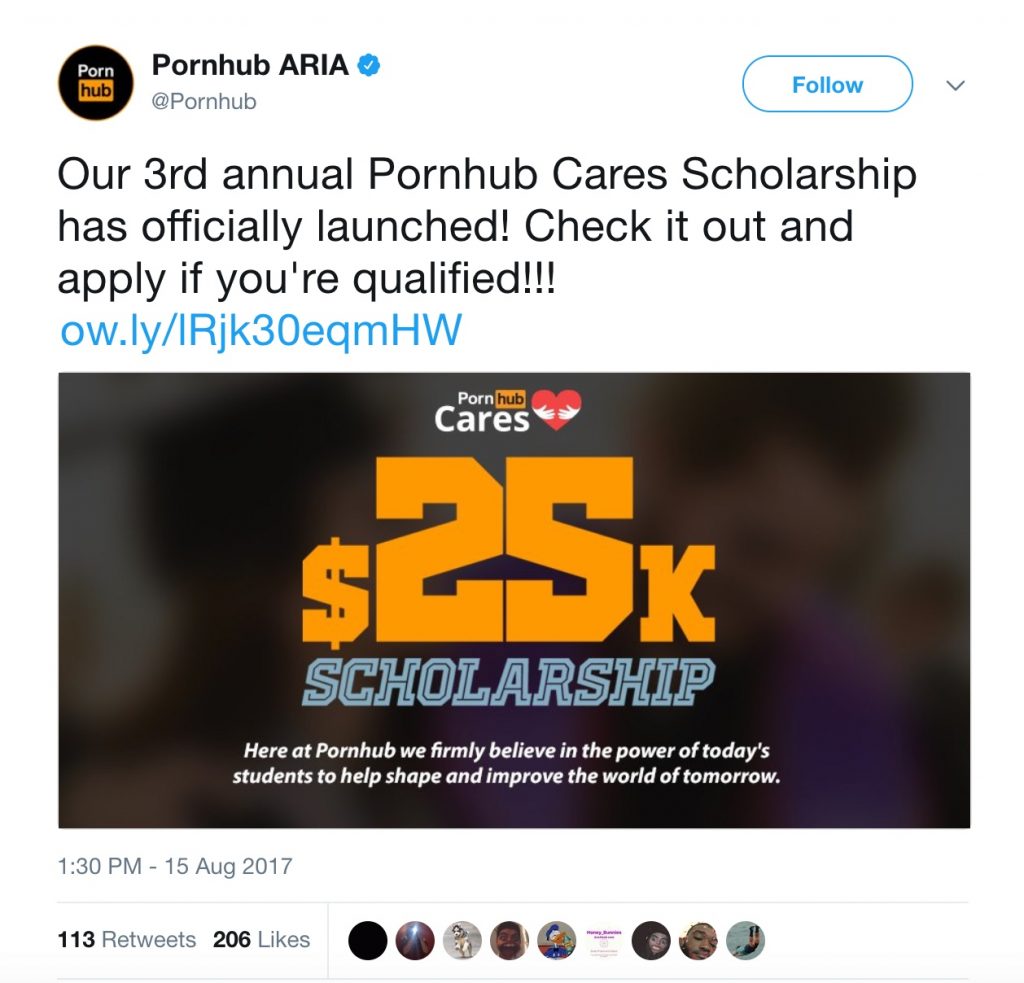
But normalizing Pornhub also means normalizing what are seen as dubious practices in the adult industry. For years, Pornhub and MindGeek have been the boogeymen of porn. Producers say that in the past they didn’t just license content and offer it for free, but turned a blind eye to, and so accelerated, piracy, driving down studio profits so much that many had to work with the conglomerate, fail, or find some small, stable market or gimmick to survive. The collapse of traditional porn and lower profits of remaining studios has tanked performers’ incomes and job security, pushing them to supplement porn with other forms of sex work like stripping or escorting. (MindGeek has disputed these charges over the years, absolving itself of responsibility for problematic industry dynamic shifts.)
“It’s a classic rebranding effort,” said the sociologist Chauntelle Tibbals, another way in which Pornhub acts like a traditional, mainstream corporation, building an image of acceptability and ubiquity so strong that it can gloss over its allegedly problematic foundations. Pornhub and other porn sites’ social good campaigns and the PR built around them aren’t goofy news stories. They’re corporate posturing—the same as any other campaign we would be wary of in the wider world of business, like Big Soda’s pro-exercise and -health campaigns that seem good and self-conscious, but really point away from their role in obesity and put all responsibility on consumers. They are worthy of a chuckle, sure, but they need to be probed like any other corporate messaging. Which is to say that they do need to be normalized, just not in the uncomplicated way Pornhub may desire.
We’re a long ways off from normalization, though. Today, “these sites are media and consumer darlings,” said Tibbals. And “we fall for it, over and over again.”
